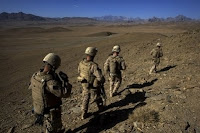by Dan De Luce
 By openly declaring their views on the Afghan war, US military leaders have placed President Barack Obama in a bind as he faces a fraught decision over the troubled US-led mission.
By openly declaring their views on the Afghan war, US military leaders have placed President Barack Obama in a bind as he faces a fraught decision over the troubled US-led mission.
Obama has refused to quickly approve a request from his commanders for a major troop build-up in Afghanistan, insisting first on a full vetting of the current strategy.
But while a war council takes place behind closed doors at the White House, top military officers have made no secret of their view that without a vast ground force, the Afghan mission could end in failure.
"They want to make sure people know what they asked for if things go wrong," Lawrence Korb, a former assistant secretary of defense, told AFP.
As a result, if Obama chooses to change course in Afghanistan or decline a request for large numbers of troops, he will be rejecting the advice of the US military, raising the political stakes.
Commentators on the left say the military ought to keep its advice private without trying to influence public debate, with New York Times columnist Frank Rich accusing the generals of an attempt to "try to lock him (Obama) in" on Afghanistan.
Korb said the top brass is keen to avoid a repeat of the run-up to the Iraq war under former president George W. Bush, when military leaders bowed to White House demands for a small invasion force -- with disastrous consequences.
Drawing on blood-soaked experience in Iraq, military commanders now fervently embrace counter-insurgency doctrine, which calls for large numbers of troops providing security and winning the trust of the local population.
Amid rising casualties and a spreading insurgency, skeptics in Congress and the White House have floated proposals to freeze or even reduce the 65,000-strong force.
But McChrystal and his superiors have dismissed such alternatives as half-measures.
"You can't hope to contain the fire by letting just half the building burn," McChrystal told Newsweek.
Top US military officer Admiral Mike Mullen and the head of the regional Central Command, General David Petraeus, have publicly endorsed the manpower-intensive strategy set out in a report by McChrystal.
The commander's stark assessment of the war, which was leaked, has set off a flurry of counter-leaks in US newspapers with unnamed officials in the White House voicing skepticism about esclating the American commitment.
The heated debate over war strategy mostly pits hawks on the right demanding Obama promptly endorse the commander's request for more troops against voices on the left who raise the specter of a quagmire akin to Vietnam.
Senator John McCain and other Republicans invoke Iraq, arguing the US military turned the tide there only after a "surge" of additional combat troops and tactics suited to irregular warfare.
McCain has praised Bush for approving the surge strategy in late 2006, a move that was opposed by most of the US military leadership at the time.
Dismissing calls by Democrats to hold off on a troop buildup until training more Afghan security forces, McCain said: "We've seen this movie before, it didn't work in Iraq and it won't work in Afghanistan."
But the disputed election in Afghanistan, tainted by allegations of widespread fraud, has jolted the administration and renewed serious doubts about the credibility of the Kabul government.
"Nobody expected it to go this poorly and that I think that has got people thinking," Korb said.
The White House meanwhile acknowledged some members of Obama's team have been reading "Lessons in Disaster," a book about flawed decision-making in the Vietnam war.
In the book, author Gordon Goldstein suggests the late president John F. Kennedy, if he had lived, would have rejected the military's demand for combat troops in Vietnam -- as he had lost faith in his generals' advice after the Bay of Pigs fiasco in Cuba.
"Perhaps this is Obama?s JFK moment," George Packer of the New Yorker wrote in his blog. "We?ll know in a few weeks."
